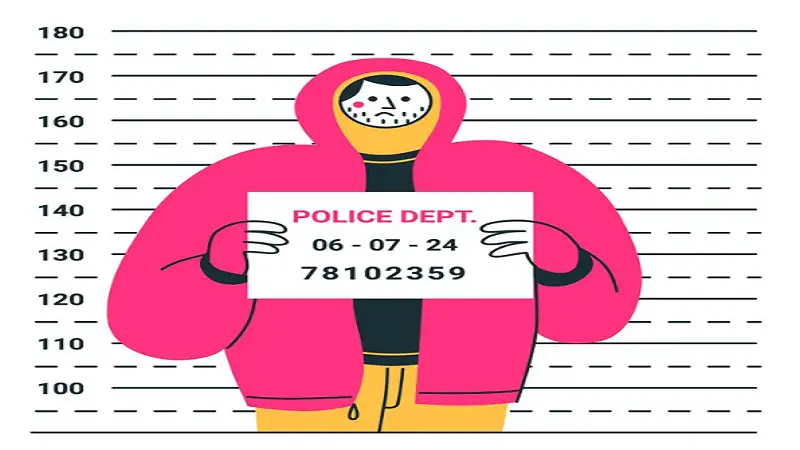What Is the Kankakee Mugshot Zone?
The “Kankakee Mugshot Zone” refers to an online space, a virtual ecosystem if you will, where individuals arrested in Kankakee County, Illinois, have their mugshots published. These mugshots are typically made available through websites, news outlets, and various public records portals. The publication of mugshots is not unique to Kankakee; in fact, many counties and municipalities across the United States feature similar platforms.
However, the Kankakee Mugshot Zone has gained particular attention for its high visibility and the way it has impacted the community. These mugshots often serve as a public record of individuals arrested for various offenses, ranging from misdemeanors to more serious criminal charges. While the arrest record itself is public information, the publication of these images online can create lasting consequences, both for the individuals involved and for the public’s perception of justice.
The Growing Popularity of Mugshot Websites
In the digital age, websites dedicated to publishing mugshots have become increasingly common. Sites like Mugshots.com and BustedMugshots.com have attracted millions of visitors annually. These platforms capitalize on the public’s inherent curiosity about crime and its sensationalistic portrayal in the media.
Local news outlets also contribute to the Kankakee Mugshot Zone by publishing mugshots of individuals arrested in the region. These images, often accompanied by brief descriptions of the charges, are easily accessible through search engines. While some may argue that these publications are simply fulfilling a journalistic duty, others assert that they contribute to the erosion of privacy and the perpetuation of negative stereotypes about individuals who have been arrested, even if they have not been convicted.
The Impact of the Kankakee Mugshot Zone on the Community
The consequences of publishing mugshots are far-reaching, impacting both individuals who have been arrested and the community as a whole.
1. Stigmatization and Long-Lasting Consequences
One of the most significant impacts of mugshot publication is the long-lasting stigma that it creates for individuals, even if they are never convicted of a crime. The mere fact that someone was arrested can result in personal and professional consequences that persist long after the charges are dropped or dismissed.
Individuals who have been arrested may find it difficult to secure employment, housing, or even social acceptance due to the public visibility of their mugshot. Employers and landlords often conduct background checks, and a mugshot appearing online can be a major obstacle to moving forward in life. While arrest records are public information, the ease with which mugshots are accessed online can cause irreparable damage, overshadowing the presumption of innocence.
2. Erosion of Privacy
The publication of mugshots also raises important concerns about privacy rights. While the arrest itself is a matter of public record, the exposure of a person’s mugshot online introduces a new level of public scrutiny. Arrested individuals may face judgment, harassment, or even threats based solely on their mugshot, which is often the first thing people see when they search for their name.
This digital exposure can be especially harmful to individuals arrested for minor offenses or those who were wrongfully detained. In these cases, the publication of a mugshot can lead to the spread of misinformation and cause irreparable harm to a person’s reputation, regardless of the ultimate outcome of their case.
3. Public Perception of Crime and Justice
The proliferation of mugshots in the Kankakee Mugshot Zone also contributes to shaping public perceptions of crime and justice. When individuals are repeatedly exposed to images of those arrested, it can lead to the normalization of criminal behavior or skew their understanding of the justice system.
Furthermore, the publication of mugshots often focuses on individuals arrested for crimes that are sensational or widely feared, such as violent offenses or drug-related arrests. This selective coverage creates an exaggerated sense of crime in the community and may skew public perception. As a result, individuals may view the criminal justice system as being less about fairness and rehabilitation and more about punishment and public spectacle.
Ethical and Legal Considerations Surrounding Mugshot Publication
While the Kankakee Mugshot Zone and similar platforms offer access to public information, the ethical implications are significant. Many question whether the publication of mugshots without any context or subsequent updates about the outcome of a case is fair, especially when individuals are not convicted of a crime.
1. The Presumption of Innocence
One of the most fundamental principles of the American justice system is the presumption of innocence. Individuals arrested for a crime are entitled to be presumed innocent until proven guilty. However, the widespread publication of mugshots undermines this principle. An arrest should not automatically equate to public shame, yet mugshots often portray individuals in the most vulnerable light, even if they have not been convicted.
2. The Problem of ‘Mugshot Extortion’
Another ethical issue associated with the publication of mugshots is the practice of “mugshot extortion.” Some websites that publish mugshots offer to remove them for a fee, creating a financial burden on individuals who are already facing legal challenges. This practice has been criticized as predatory, with many individuals feeling forced to pay for the removal of their mugshots to protect their reputations.
The Illinois state legislature has attempted to combat this issue by passing laws that make it illegal for websites to charge for the removal of mugshots. However, these laws have met with limited success, as some websites find ways to circumvent regulations, leaving many individuals vulnerable to exploitation.
3. Accountability and Transparency
On the other hand, supporters of mugshot publication argue that these sites provide a level of transparency and accountability in the criminal justice process. Mugshots, along with arrest records, are part of the public domain, and making them easily accessible allows the public to stay informed about criminal activity in their communities. Some view it as an important civic tool that helps to maintain oversight of law enforcement agencies.
The Kankakee Mugshot Zone and the Digital Era of Justice
The rise of mugshot zones like the one in Kankakee is a microcosm of the broader shift towards digital justice. With the advent of online platforms and the ease of information-sharing, the lines between public records and personal privacy have become increasingly blurred.
1. The Role of Social Media
Social media platforms have amplified the visibility of mugshots. It is not uncommon for local news outlets or even individuals to share mugshots on platforms like Facebook, Twitter, or Instagram. This amplifies the reach of mugshots, often before individuals have had the chance to address or contest the charges against them.
In some cases, this digital amplification can lead to social shaming, cyberbullying, or worse. The viral nature of social media can spread a mugshot far beyond its original audience, leaving the person arrested in a perpetual state of public scrutiny.
2. Technological Innovations in the Justice System
The Kankakee Mugshot Zone also highlights a growing trend in which technology plays an increasingly central role in the justice system. The widespread use of online databases, facial recognition software, and AI-driven analytics has transformed how law enforcement agencies track and report on criminal activity.
While these innovations bring certain benefits, such as enhanced efficiency in identifying suspects, they also raise concerns about fairness, accuracy, and potential abuse. The increased reliance on digital platforms to disseminate arrest records and mugshots raises questions about accountability and the potential for systemic bias in the criminal justice system.
Conclusion: Moving Forward with Compassion and Justice
The Kankakee Mugshot Zone and similar platforms bring attention to the complex intersection of public information, digital privacy, and criminal justice. While the publication of mugshots serves the public’s right to know, it also raises important ethical questions about the presumption of innocence, the long-lasting impact of public exposure, and the financial burden on individuals seeking to remove their mugshots from the internet.
As we move forward, it is essential to balance transparency with empathy, recognizing that everyone, regardless of the charges they face, deserves the opportunity to rebuild their lives after an arrest. Legal reforms, ethical guidelines, and greater public awareness can help ensure that justice is not only done but seen to be done in a way that respects the dignity and rights of all individuals involved.
Ultimately, while the Kankakee Mugshot Zone reflects a growing trend in the digital age, it also underscores the need for society to find ways to integrate technology into the justice system that respects both public access to information and the privacy of individuals. Only then can we create a justice system that truly serves the interests of fairness and compassion for all members of the community.






